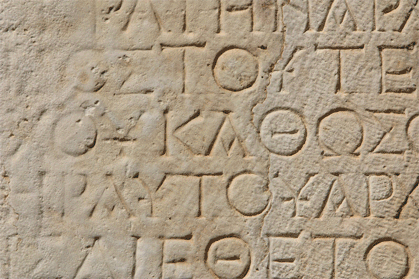[First posted in AWOL 22 April 2011. Updated 10 June 2014]
n.b.: A note from the editor: "As Teaching Classical Languages enters its fifth year of publication and as the standards for online publication metamorphose before our eyes, it seems a good time to take stock of how our readers access the journal. How are your reading habits changing? In what formats do you read academic articles? On what devices do you read the sort of research and practical advice contained in TCL? Please click on https://www.surveymonkey.com/s/Z2M75SD and take our brief five-minute survey and let us know how we can redesign TCL to be more responsive to your needs. "
Teaching Classical Languages (TCL)
ISSN 2160-2220
n.b.: A note from the editor: "As Teaching Classical Languages enters its fifth year of publication and as the standards for online publication metamorphose before our eyes, it seems a good time to take stock of how our readers access the journal. How are your reading habits changing? In what formats do you read academic articles? On what devices do you read the sort of research and practical advice contained in TCL? Please click on https://www.surveymonkey.com/s/Z2M75SD and take our brief five-minute survey and let us know how we can redesign TCL to be more responsive to your needs. "
Teaching Classical Languages (TCL)
ISSN 2160-2220
Teaching Classical Languages (ISSN 2160-2220) is the only peer-reviewed electronic journal dedicated to the teaching and learning of Latin and ancient Greek. It addresses the interests of all Latin and Greek teachers, graduate students, coordinators, and administrators. Teaching Classical Languages welcomes articles offering innovative practice and methods, advocating new theoretical approaches, or reporting on empirical research in teaching and learning Latin and Greek. As an electronic journal, Teaching Classical Languages has a unique global outreach. It offers authors and readers a multimedia format that more fully illustrates the topics discussed, and provides hypermedia links to related information and websites. Articles not only contribute to successful Latin and Greek pedagogy, but draw on relevant literature in language education, applied linguistics, and second language acquisition for an ongoing dialogue with modern language educators.
TCL is the successor to CPL Online. To see the CPL Online archives, click here.Fall 2013
In this issue:
- Christine L. Albright - Reimagining Latin Class: Using the Reacting to the Past Pedagogy in the Intermediate Latin Course
- Henry Bayerle - Team-Based Learning to Promote the Study of Greek
- Nikos Manousakis - Blended Learning in an Advanced Course on Greek Tragedy
- Doug Clapp - De Lingua Latina Discenda
Spring 2013
In this issue:
- Timothy Moore - Song in the Greek Classroom
- Jennifer Sheridan Moss - Computer-Assisted Learning in Second-Year Latin
- Jacqueline Carlon - The Implications of SLA Research for Latin Pedagogy: Modernizing Latin Instruction and Securing its Place in Curricula
- William Brockliss - Latin and Power: Warnings and Opportunities from the Long History of the Language
- John Gruber-Miller - Engaging Multiple Literacies through Remix Practices: Vergil Recomposed
Fall 2012
In this issue:
- Mark Thorne - Using Manuscripts in the Latin Classroom
- Christine Hahn - Latin in the Homeschooling Community
- Antonia Syson - Reading the Aeneid with intermediate Latin students: the new Focus commentaries (Books 1-4 and 6) and Cambridge Reading Virgil (Books I and II)
Fall 2011
In this issue:
- Eric Dugdale - Creative Composition in Beginning Latin
- Wilfred E. Major and Byron Stayskal - Teaching Greek Verbs: A Manifesto
- Albert Watanabe - The 2011 College Greek Exam: Report and Analysis
- Stephen Trzaskoma - Innovation in Recent Intermediate Greek Textbooks?
Spring 2011
In this issue:
- Yasuko Taoka - Classroom as Text: What Genres Do We Teach In?
- Tracy Jamison Wood - Third Language Acquisition: Spanish-Speaking Students in the Latin Classroom
- Judith Lynn Sebesta - Aliquid Novi: The New Series of Bolchazy-Carducci Latin Readers
Fall 2010
In this issue:
- Rebecca R. Harrison - Exercises for Developing Prediction Skills in Reading Latin Sentences
- Peter Anderson and Mark Beckwith - Form-Focused Teaching for the Intermediate Latin Teacher
- Albert Watanabe - The 2010 College Greek Exam
Spring 2010
In this issue:
- Lindgren et al. - From Literal to Literary: A Translation Project for Latin Poetry Classes
- Traill et al. - Building Ties between College and High School Latin Programs
- Ancona, Collins, Daugherty, Holec, Kitchell, Patrick, Pearcy - Perspectives on the New Standards for Latin Teacher Preparation
Fall 2009
In this issue:
- Andrew Reinhard - Social Networking in Latin Class
- Georgia L. Irby-Massie - "That Ain't Workin'; That's the Way You Do It": Teaching Greek through Popular Music
- Rachael Clark - Greek Vocabulary in Popular Textbooks
See the full List of Open Access Journals in Ancient Studies
